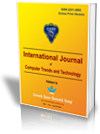Analysis of SW Education Program of SW Leading Elementary, Middle and High schools |
||
 |

|
|
| © 2022 by IJCTT Journal | ||
| Volume-70 Issue-1 |
||
| Year of Publication : 2022 | ||
| Authors : Pyung Kim | ||
| DOI : 10.14445/22312803/IJCTT-V70I1P102 | ||
How to Cite?
Pyung Kim, "Analysis of SW Education Program of SW Leading Elementary, Middle and High schools," International Journal of Computer Trends and Technology, vol. 70, no. 1, pp. 4-9, 2022. Crossref, https://doi.org/10.14445/22312803/IJCTT-V70I1P102
Abstract
SW education is to cultivate talented people who logically solve problems through computational thinking, and software education has been operated as a regular subject in an elementary, middle, and high school education environment in Korea since 2018. In this study, SW education programs, SW education tools, and activities for each school level were described through the analysis of 107 SW leading school operation programs in the Jeonbuk region in 2020. In addition, improvement measures were derived for the effectiveness of SW education and the establishment of SW education through the operation of SW leading schools. This study can understand the necessity of operating SW education for each elementary, middle, and high school level and contribute to the policy improvement for establishing SW education.
Keywords
SW education in elementary, middle and high school, SW leading school, AI education, SW education language, physical programming, robot programming.
Reference
[1] K. Schwab, Available: https://www.weforum.org/about/the-fourth-industrial-revolution-by-klaus-schwab, Industrial Engineering Magazine 23(2), 13-22.
[2] J. F. Sargent. The US science and engineering workforce: Recent, current, and projected employment, wages, and unemployment. 2017.
[3] e-Skills UK. Technology Insights 2012. Available: https://www.e-skills.com/Documents/Research/Insights-2012/, TechnologyInsights_2012_UK.pdf. Accessed 9 October 2015.
[4] P. J. Rich, N. Bly, K. R. Leatham, Beyond Cognitive Increase: Investigating the Influence of Computer Programming on Perception and Application of Mathematical Skills, Journal of Computers in Mathematics and Science Teaching, 33(1) (2014) 103-128.
[5] A. Lamprou, A. Repenning, N. A. Escherle. The Solothurn Project: Bringing Computer Science Education to Primary Schools in Switzerland, In Proceedings of the 2017 ACM Conference on Innovation and Technology in Computer Science Education, ACM. (2017) 218-223.
[6] K. Kim, An Implications of Computer Education in Korea from the U.S., U.K. and Germany Computer Curriculums, Journal of The Korean Association of Information Education, 20(4) (2016) 421-432.
[7] Ministry of Education(2015). Practical Arts (Technical Assumption)/Information Curriculum. Ministry of Education Notice 2015-74 [Annex 10]. Sejong: Ministry of Education.
[8] J.Seo, C. Gu, Software education research school effectiveness analysis. Journal of the Korean Society for Computer Education, 23(1) (2018) 263-284.
[9] D. Ma, A Comparative Analysis Study on the Perceptions and Attitudes of Elementary School Teachers and Students on SW Education -Focusing SW education leading schools and general schools-,Journal of The Korean Association of Information Education, 25(1) (2021) 185-193.
[10] J. Park, An Analysis on the Current Status and Effectiveness of Software Education Leading School, Journal of Digital Contents Society 21(10) (2020) 1845-1854.
[11] S. Kim, et al., Development a Standard Curriculum Model of Next-generation Software Education, Journal of The Korean Association of Information Education, 24(4) (2020) 337-367.
[12] E. Lee, A Comparative Analysis of Contents Related to Artificial Intelligence in National and International K-12 Curriculum. Journal of Korean Association of Computer Education, 23(1) (2020) 37-44.
[13] J. You, et al., Elementary and secondary artificial intelligence education content system Exploratory Research Issues Report, KOFAC, (2020).
[14] S. Park, An Analysis Study of SW·AI elements of Primary Textbooks based on the 2015 Revised National Curriculum, Journal of The Korean Association of Information Education,25(2) (2021) 317-325.
[15] Y.Jeong, et al., A Development of the Software Education Curriculum Model for Elementary Students, Journal of The Korean Association of Information Education,19(4) (2015)467-480.
[16] K. Kim, et al., Development a Standard Curriculum Model of Next-generation Software Education. Journal of The Korean Association of Information Education, 24(4) (2020) 337-367.
[17] S. Ahnm S. L, Analysis of 2015 Revised SW Curriculum in Elementary and Middle School based on Core Competency, The Korean Society for Creative Information Culture, 5(1) (2019) 63-70.
[18] J. Kim, Current status and future of SW·AI education in secondary school. Communications of the Korean Institute of Information Scientists and Engineers, 39(9) (2021) 27-34.
[19] H. Woo, H. Lee, J. Kim, W. Lee, Analysis of Artificial Intelligence Curriculum of SW Universities. The Journal of Korean Association of Computer Education, 23(2) (2020) 13-20.
[20] D. Ma, Comparative study of SW education leading Middle & High schools and General school. Journal of Korean Association of Computer Education, 25(1) (2021) 157-164.
[21] S. Kim, J. Hong, D. Koo, J. Park, Y. Lee, Recognition of SW Education of Students, Parents, and Teachers in Elementary, Middle and High Schools: Focused on the SW Leading School, Journal of Korean Association of Computer Education, 23(6) (2019) 591-598.
[22] K. Oh, J. Kwon, A Study on the Verification of Computational Thinking Effectiveness of Understanding-Oriented SW Basic Education Program. The Society of Digital Policy & Management, 17(10) (2019) 23-35.
[23] S. Lee, J. Han, Analysis on Creativity and Solving-Problem Ability with Hackathon-based Elementary SW Education. Journal of Digital Contents Society, 18(5) (2017) 995-1000.
[24] S. Lee, Analyzing the effects of artificial intelligence (AI) education program based on the design thinking process. The Journal of Korean Association of Computer Education, 23(4) (2020) 49-59.
[25] J. Hong, Development and application of SW program based on Novel Engineering for improving the creative problem-solving ability of elementary students. Journal of Digital Contents Society, 19(12) (2018) 2315-2321.
[26] P. Kim, A Study on the Strengthening Method of SW Education Capacity for Pre-elementary School Teachers, International Journal of Computer Trends and Technology 69(1) (2021) 13-17.
[27] P. Kim, A Study on the Functionality and Effectiveness of SW Education Tools, International Journal of Computer Trends and Technology 68(1) (2020) 11-15.
